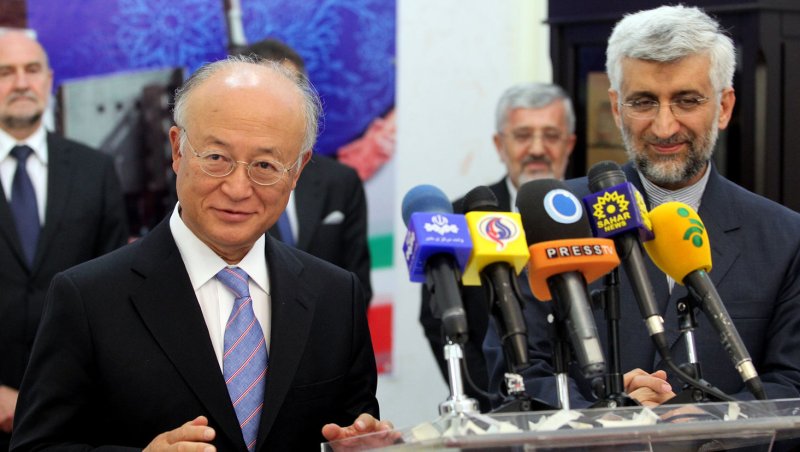The UN nuclear chief Yukiya Amano (L) speaks to the local media as Iran's chief nuclear negotiator Saeed Jalili (R) looks on in Tehran, Iran on May 21, 2012 . Amano's visit comes two days ahead of Tehran's meeting on Wednesday in Baghdad with a group of world powers, to discuss concerns over Iran's suspected nuclear weapons drive. UPI/Fars News /Hamed Jafarnejad |
License Photo
BAGHDAD, May 22 (UPI) -- The signals coming out of Tehran in recent days suggest a breakthrough is possible in talks in Baghdad Wednesday between the five permanent members of the U.N. Security Council plus Germany and Iran over its contentious nuclear program.
Even the Israelis, whose government has been threatening pre-emptive strikes against Iran's nuclear facilities, are conceding that tone of Iranian statements in the runup to the crucial high-profile talks are conciliatory and optimistic.
So much so, that Prime Minister Binyamin Netanyahu and his associates, who have opposed the talks, are expressing grave concerns about that a deal may be struck.
That would probably be along the lines of Iran agreeing to surrender its 20 percent enriched uranium, which is needed to produce nuclear weapons, in return for fuel rods for its research reactor in Tehran.
This "intermediate agreement" would also involve the P5+1 powers -- The United States, Russia, Britain, France and China, with Germany -- agreeing to lift some of the tight sanctions against Iran and allow it to continue limited uranium enrichment at more exposed facilities that are easier to attack.
A deal like that, Western analysts say, would effectively rule out the need for any pre-emptive attacks along the lines that Netanyahu and Israeli Defense Minister Ehud Barak have been threatening.
But it would not necessarily completely eliminate the prospect of Israeli air and missile strikes, or even the covert campaign of assassinating Iranian nuclear scientists to slow down the nuclear program that Israeli hardliners sees as an existential threat.
Barak, a former prime minister and chief of Israel's general staff, has made clear that anything short of a complete shutdown of Iran's nuclear program, which Tehran insists is for peaceful purposes, would be "too little" and "leave the issue unresolved.
Still, Israel's liberal Haaretz daily reports that despite the hard line Netanyahu takes in public he's showing signs of more flexibility regarding a possible deal with Iran.
An agreement, as outlined, would undoubtedly lower tensions in the Persian Gulf where U.S. forces have been locked in a confrontation with the Iranian for many months.
The Baghdad talks follow an earlier, more exploratory meeting in Istanbul in mid-April that showed the Iranians in an unexpectedly conciliatory mood.
"Economic sanctions and political isolation have, of course, deeply hurt the Iranian regime, especially the Revolutionary Guards, whose leaders and industries have been directly targeted by the international community," observed Mehdi Khalaji of the Washington Institute for Near East Policy.
"But these are not the only factors in play.
"The Iranian regime's propaganda machine is already portraying the Istanbul talks as a triumph for the Islamic Republic and a setback for the West," he said. "Indeed, the regime is setting the stage for a significant compromise by preparing both the Iranian public and the global community for that eventuality."
This poses a big problem for Iran's supreme leader, Ayatollah Ali Khamenei, who for years was an uncompromising advocate of Iran becoming a nuclear power, but now sees compromise as a viable option.
But, as Khalaji and others observe, "compromising is as dangerous for the supreme leader as digging in his heels," particularly while he's engaged in a power struggle with Iran's president, Mahmoud Ahmadinejad.
Still, says Khalaji: "For Khamenei, nuclear capability is not a goal but rather a means to force the West and its regional allies to recognize the regime's strategic interests."
So within that context, "a guarantee that the West, especially the United States, is not seeking the overthrow of Iran's leaders would have to be a key component of a nuclear compromise," Khalaji says.
On Monday, Yukiya Amano, head of the U.N.'s nuclear watchdog body, reported he'd negotiated a deal with Iran to allow the International Atomic Energy Agency to resume a long-stalled investigation to determine whether Iran's nuclear program is, as Western powers allege, developing nuclear arms.
Allowing the IAEA access to nuclear sites, scientists and records would put the onus on the six-power coalition to ease, or possibly lift, the sanctions throttling the Islamic Republic's oil exports and crushing its economy.
Amano's visit to Tehran Sunday was totally separate from the Baghdad talks. But if Iran provides the IAEA with the promised access, it could wind down the confrontation in the Persian Gulf and the threat to global oil supplies.





